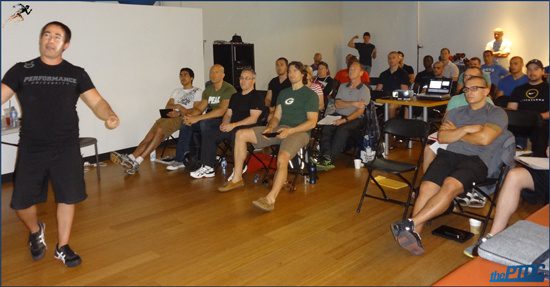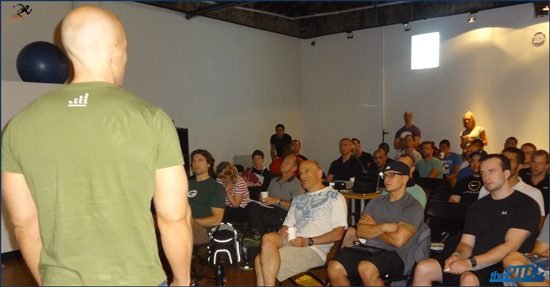Fitness conferences, workshops, and conventions can be a tremendous professional development accelerator. However while everyone pays the same fee, not everyone gets the same return on their investment.
Since you're going to be dropping some of your hard-earned cash and giving up your valuable time, you want to get everything you possibly can out of any fitness educational event. As one who has presented many times and sat in the audience, here are some tricks to help you get the most out of your next fitness conference.

If you ever attend a PTDC event maybe you'll get to partake in our funny-face picture too.
1. Do your homework
You don't have enough time or money to go to all the fitness conferences, so be sure to know what your options are and which ones are the right fit for you. Also, if it's not local, be sure to factor in the travel costs.
2. Register early
Many fitness conferences have session options. The most popular topics and speakers will fill up first. The faster you get your registration in, the better chance you have of getting the sessions you want. Otherwise, you might be a guy who specializes in male powerlifting stuck at a session on post-natal fitness.
Another great reason for early registration is that you will often get a better rate. Conference promoters will bribe you with an early-registration discount so they can know ahead of time if they have enough bodies to run the show.
3. Consider volunteering
Not only is offering a helping hand a noble thing to do, it also offers two huge perks:
1) You get to attend sessions for free (most of your work happens before, between and after the sessions), and
2) You get to meet the presenters. If you're tight on cash, don't let that stop you from going -- volunteer.
If you're interested in volunteering and the conference that you want to attend doesn't promote a space specifically to do so, simply email the organizer.
4. Research the presenters
At bigger fitness conferences you may already know the presenters and follow their work. However, other times you may not know the people speaking. In this case, check them out. Who are they? Who have they trained? What are their credentials? What do they specialize in?
If you can find someone of their work online, read this ahead of time to get to know the person. This is very important for picking sessions. Just because someone has a catchy session title doesn't mean that this person is worth hearing.
From Jon: When researching presenters or those at the event to network with try to identify uncommon commonalities. That is, the 1% that makes the person unique and different that you have in common.
When speaking to them at the event your time will be limited but if you can engage them on one of these uncommon commonalities you have a better chance of making an impact.

Coach Nick Tumminello throwing down.
5. Prep questions ahead of time
Once you know your presenters, prep some questions ahead of time. A while back I went to a Strength & Conditioning conference and got to hear the legendary Coach Al Vermeil speak. After the sessions, we got to have Q & A time with each presenter.
There I was in a room with one of the most successful strength coaches of all time and at the end of a long day of learning, I couldn't come up with any questions - until the drive home when several great questions finally came.
Once you have researched your presenters, reflect and make a list of questions you would like to ask. Then after the session if he/she ask, "any questions?" you can be the first to jump in while everyone else is waiting and thinking of their questions.
6. Always go with a colleague
For local fitness conferences this offers a chance to car pool. For non-local conferences, you can share cab fees and hotel rooms. However the main benefits are not financial or environmental - they're your development.
When you go with a colleague means you will likely talk shop on the way there - and this is very valuable for your professional development. When you arrive, having a buddy makes it easier for the two of you to connect with others and find loners to join your mini group for even better shop-talk.
Then (and this is the best part) on the way home from the conference, you'll inevitably discuss the conference. This is where you go through and reflect on everything you learned and together discuss what are the real "take-home and use at work on Monday gems" that you got from the event.
7. Never argue
If you've been to enough fitness conferences, you'll inevitably been in a session with "that guy." You know, the one who thinks he is the ultimate authority of fitness and the defender of training truth. The presenter will say something he doesn't agree with and then for the next way too many minutes everyone sighs and pulls out their phones while this guy wastes everyone's time arguing with the presenter.
Please don't be this guy. When I go to a fitness conference, I go with an open mind. I want to hear and clearly understand what the presenter has to say. I don't care if I agree with 100% of what was said - I don't think I ever have, but that doesn't matter. Arguing is a complete waste of time. This also applies to "discussions" with other trainers between sessions. Use this as an opportunity to have your belief systems challenged. If you don't agree with somebody, ask them questions about their point of view.
8. Reflect afterwards
While you want to go with an open mind; that does not mean that you want to believe and try to apply everything you hear. After the sessions and on the way home is when you want to really chew through what was said and reflect on how this will impact your training practice.
9. Only ask presenters two types of questions
Instead of arguing or "discussing", there are really one or two types of questions that you should ask a presenter.
- A clarification question. If you're not sure what the speaker is getting at, then a quick clarification question will ensure you and everyone else are tracking properly.
- An opinion question. While I may not agree with it, I value the professional opinion of a respected colleague. Note: opinion questions are usually best left until the end of the session.

Coach Dan Trink musing on how to get strong.
10. Have realistic expectations
At a conference, you'll typically have 3 types of presentations. The first 2 you will be familiar with as Jonathan has talked about them before here on PTDC.
1. Innovators: these could be researchers who share their latest research studies with you. If you have been in the game a while, you'll likely not be surprised by their findings. Training research is not cutting edge. Instead, it serves to validate what coaches and trainers are already doing. Innovators may also be folks who come up with creative new exercise variations. If the presenter is good, you may find some helpful new tools for your tool box with these sessions.
2.Simplifiers: these are fellow trainers and coaches who take a bunch of information on a topic and package it for you in a simple, easy-to-use format. While this isn't the most exciting, it can be the most helpful when you get back to work on Monday.
3.Complementary professionals: these people may be physiotherapists, chiropractors, naturopath doctors, or a variety of other health care professionals. Trainers tend to love these sessions as they seem so new and cutting edge. The reason for this is that you're learning from a different profession. There are many other great professions that we can and should learn from. However, don't forget that there are many things that we can do better than these professionals. Learn from them, but don't try to be them.
11. Help the presenter
I love presenting at fitness conferences. Most trainers are positive, enthusiastic, and excited to be there (this is not always the case when I teach university students). When I'm presenting, I try to find a few keeners in the audience. I keep coming back to them visually as I present and it really helps me out. I get more energy from them and I speak better.
When you are at a fitness conference, don't be shy. Sit in the front, take notes, actively listen, watch your body language and make eye contact with the presenter. You'll learn more and help the presenter - which everyone will benefit from. Bonus tip: when you're at the front, you can quickly get the presenters attention during a Q & A time.
12. Maximize your time between sessions
It's been sad that it's the time between sessions where the real learning takes place. This is where you can really capitalize on your investment and it's what makes conferences unique compared to just buying books for personal trainers or DVDs.
After the session, ask those sitting around you what they thought of it. Most folks love sharing their opinions and this will initiate some great discussion and help everyone reflect and digest what was just presented. Time between sessions is also an amazing opportunity to network.
Have your company logo on your shirt and a stack full of business cards. Give one to everyone you meet. Collect cards and contact info from others as this can be invaluable. You never know when you might be looking for a job or looking for someone to hire. Also, as you build up your professional network, you develop a great group of colleagues that you can bounce ideas off of and ask questions to.
13. Type your notes up after the conference
That night or the next day, take all your hand-written notes while they're fresh in your head and type them up. This will give you a digital copy of things that you can store for future reference and easy retrieval.
14. Share with others
One of my clients wisely told me, "To teach is to learn." If you want to really know that you have a solid grasp of the material, try teaching it to someone else. Find other colleagues, staff, or interns who would benefit from the info and teach it to them. If you blog, share some what you learned on your blog. Sharing the info will take your understanding of it to a whole new level!
Don't miss out on going to fitness conferences, workshops, and conventions. They can be a great way to accelerate your professional development. However, when you go, don't miss out on the opportunity to get the most out of the valuable time and money you spent to be there.










